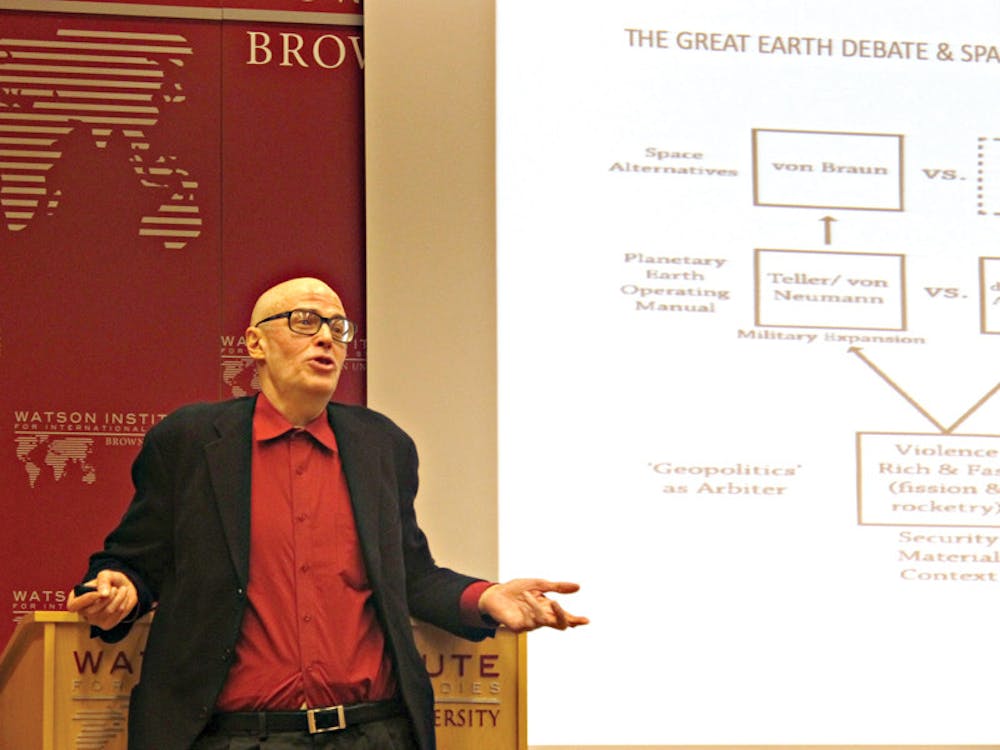Those who consider space “the last frontier” may not have thought reaching for the stars would pose a threat to Earth. In his lecture “The Sky is the Limit: The Errors and Dangers of Space Expansionism,” Daniel Deudney, associate professor of political science at Johns Hopkins University, criticized the optimism surrounding space expansionism and emphasized its associated security issues.
Humans have a history of looking at the night sky “in awe, in wonder, curiosity and have conjured expectations that the sky is the abode of great powers,” Deudney said. Once it became possible to put humans into space, proponents of exploration “developed an elaborate argument about why it’s desirable to go into space,” he said.
Deudney deconstructed arguments for space expansion, which he said are “never subjected to very serious critical analysis.” The pure expense and energy necessary to put objects into space — it costs $10,000 per pound, Deudney said — is a problem, and the process has remained expensive for the past 50 years.
“The Apollo program cost as much as the interstate highway system,” he said.
Deudney disputed the practicality of using space expansion to further communication. The use of communication satellites is both relatively small and in decline because of the increased popularity of fiber optic cables, he said.
Space colonization also poses serious issues, Deudney said. Space is inaccessible and harshly inhospitable — as a vacuum and harbor for radiation, it is not a realistic habitat, he said. Conditions for life would disintegrate over time due to debris in space that enters orbit and collides with other objects, which is destructive and dangerous.
Deudney emphasized that space is another arena where nations compete, citing the space race of the Cold War era and current weapons testing. By expanding military activity and colonization in space, the Earth would suffer from particular vulnerabilities, Deudney said.
“Our largest space program is not the Apollo program, it’s not the space station — it’s the ballistic space inventory,” Deudney said, noting the current capability of using space for long-range bombardment. Categorizing ballistic missiles as space weapons is not the conventional approach, he said, but doing so sheds light on the risks and dangers of space activity. “It was the missile crisis that brought us to the brink of the destruction of civilization,” Deudney said.
Because space is integral — it cannot be effectively partitioned into territories like terrestrial Earth — competition for control becomes complex, Deudneysaid. This is especially relevant when it comes to Earth’s satellites, since they create a web of intersecting paths, he said. Technologies that would monitor asteroid activity and deflect incoming asteroids away from the planet could be put to other uses and allow nations to inflict catastrophic damage on one another, he said.
Deudney did point out two positive impacts of space expansionism — security through international treaties regulating vehicles like ballistic missiles and scientific knowledge about space and Earth’s vulnerability.
“We need to increasingly think about space not as the escape from Earth, but as part of the Earth,” he said, adding that a space program needs to account for “the sustainability of life on this planet.”
Kenneth Volkmann ’16, one of about 30 audience members, said his interest in space exploration drew him to the lecture, but he had “never heard an argument against it.” Volkmann said he thought that Deudney “forgot the human element — the inspiration.”
Megan Bruck Syal GS, who is studying planetary geoscience, said she appreciated the critical “pragmatic standpoint” Deudney took. Though Syal disagreed with the arguments against the utility of space exploration, she said, “he brought up some really important issues that we as a race should consider in where we devote our time and resources.”
The event was part of the Watson Institute’s Global Security Series, whose next event will be a lecture entitled “Beyond War: Technology, Economic Growth and American Influence in a New Middle East” by David Rohde ’90. It will be held April 24.

ADVERTISEMENT




